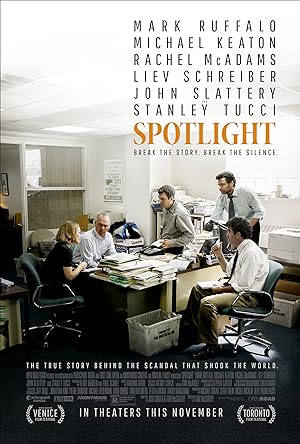I barely knew that Spotlight existed, and when I did, I had no plans to see it in theaters. A friend wanted to see a movie at a particular theater, and it was either Spotlight or Peggy Guggenheim: Art Addict with Brooklyn as a distant third and only in the running because Nick Hornby wrote the screenplay. Spotlight won because of the actors, shot in Boston and subject matter.
Spotlight is about The Boston Globe’s “Spotlight” team deciding to investigate child sexual abuse and cover up by the Roman Catholic Church. The reporters are the viewers’ proxy-their initial indifference and ignorance is our initial indifference and ignorance, their shock is our shock, their disbelief at the scope is our disbelief at the scope. So Spotlight isn’t a movie about finally giving the victims a voice. Spotlight is about how difficult it is for well-established institutions and those unaffected by abuse, i.e. the majority, to finally speak up even in a case where the moral lines of right and wrong are clear and unambiguous.
I’m not a native Bostonian. I’m not a Catholic. After leaving NYC and the land of the great and occasionally disreputable New York Times and the great couthless New York Pork, The Boston Globe rarely hit my radar. When I came to Cambridge in 1993, The Boston Phoenix was all over this scandal, and I was all over The Boston Phoenix, which finally shut its doors on March 14, 2013. The Boston Phoenix was one stop shopping: culture, cutting edge news and locally relevant. I probably don’t need both hands to count the number of times I intentionally bought The Boston Globe from 1993 to now. The rapid development of the internet does not help.
So Spotlight never could work for me because of my relationship with The Boston Globe. Until Spotlight, the movie, mentioned The Boston Phoenix’s role in exposing the scandal then casually dismissed it, I could not stop thinking that this film was more parts self-congratulatory than self-indicted and guilt-ridden. I hear Spotlight, and I think of putting on a show, which in part is what this movie is about. How do investigative journalists operate? When I hear Spotlight, I also think about how uncomfortable its glare is for those who do not want its focus, which is also what this movie is about and how resistant everyone is internally and externally to really looking at the problem even though the information has always been available. I think of anything and everything, but The Boston Globe.
How is Spotlight as a movie? Spotlight is a deeply conventional movie that uses the innate momentum of the investigation narrative to propel the story forward. Spotlight is an old-fashioned movie in the way that it begins with faith and ends with disillusion in its institutions such as newspapers, the Catholic Church, class, etc. Spotlight is the kind of movie that still imagines that journalists make more money and hobnobs with the haves than they may actually do. There is a scene where a lawyer is referred to sarcastically as a character, but other than being brusque and not polished, there is nothing unusual about this lawyer except that the magnificent Stanley Tucci plays him. Spotlight’s strongest asset is its cast: Michael Keaton, Mark Ruffalo, Rachel McAdams, Liev Shreiber, John Slattery, Jamey Sheridan (The Stand and Law & Order: Criminal Intent), Billy Crudup.
Spotlight does get kudos for acknowledging that it takes outsiders to facilitate change, but it is more comfortable sticking with the neighborhood camaraderie of the journalists and their subjects. Spotlight focuses on an implicit code that if you go against the Catholic Church, all the institutions will conspire against the individual in a darkened board room, intimidate and eventually strike them down, but while that may have happened in the past, it does not happen in or to Spotlight, and the Catholic Church’s reaction to the movie has been nothing but positive. So either Spotlight as a movie needed to do a better job of showing negative repercussions for the journalists or should have eliminated the conspiracy story line and emphasized the fact that people would prefer to be friends with a powerful pedophile than a powerless, lower class innocent victim with no need for threats or incentives.
I think that my main problem with Spotlight is that its success is predicated on the bravery of the journalists standing up for the victims and self-admonishment for not doing it sooner, but the victims are not really the focus. There is no repentance or revision in technique to guard against repeating these grave errors of reporting omission and representing minorities so how will institutions like The Boston Globe avoid making the same mistake in a different context? They won’t. Support independent media like This Week In Blackness.
Stay In The Know
Join my mailing list to get updates about recent reviews, upcoming speaking engagements, and film news.




